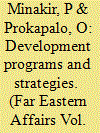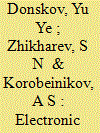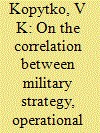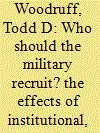|
|
|
Sort Order |
|
|
|
Items / Page
|
|
|
|
|
|
|
| Srl | Item |
| 1 |
ID:
084430


|
|
|
|
|
| Publication |
2008.
|
| Summary/Abstract |
Abstract: The Millennium Development Goals (MDGs) are a set of international development targets agreed to by members of the United Nations in 2000. The goals aim to improve many of the dimensions of extreme poverty and are to be achieved by 2015. This paper provides an overview of the issues relevant to the achievement of the MDGs in the Asia-Pacific region. The paper begins by discussing the critiques of the MDGs before assessing whether countries in the region are on track to achieve them. Issues relating to data availability and accuracy are discussed and the need to tailor the MDG targets to the special circumstances of some Asia-Pacific countries is examined. The paper proceeds by discussing the role of international assistance via international foreign development aid and non-governmental organisations in the achievement of the MDGs. The paper concludes with some policy implications for the international donor community
|
|
|
|
|
|
|
|
|
|
|
|
|
|
|
|
| 2 |
ID:
111558


|
|
|
|
|
| Publication |
2011.
|
| Summary/Abstract |
Global governance involves worldwide redistribution of power, wealth and resources. The sole super power and other powers are focusing on the struggle between unipolarity and multipolarity. Traditional powers and emerging powers are competing against each other for power and interests. And there are ongoing conflicts among western countries and fragmentation in the developing world. China-U.S. relationship is particularly complicated, multi-faceted and ever changing. But different from its relations with the U.S., China has no direct geopolitical conflict of interests or outstanding issues left over from history in its relations with Europe. China and Europe now share increasing interests in addressing major international issues, and pursue the same or similar goals and concepts in upholding world peace and stability, in seeking to resolve international disputes through peaceful means and in reforming the international financial system. This has created broad space for China-Europe cooperation in global governance.
|
|
|
|
|
|
|
|
|
|
|
|
|
|
|
|
| 3 |
ID:
110055


|
|
|
|
|
| Publication |
2011.
|
| Summary/Abstract |
This article gives a retrospective analysis of large-scale programs of regional development implemented on the territory of the Russian Far East beginning from the 1930s. A conclusion has been drawn that "dif-fuseness" of targets and/or "atomism" of financial resources leads to failure of programs. An analysis of the strategy of the socio-economic development of the Far East and the Baikal region up to 2025 has revealed the lack of concrete tasks and the need to revise the document.
|
|
|
|
|
|
|
|
|
|
|
|
|
|
|
|
| 4 |
ID:
141924


|
|
|
|
|
| Summary/Abstract |
The authors examine key factors contributing to the potential significance of electronic warfare in the general system of measures to defend ground assets on home territory from adversary aerospace attacks.
|
|
|
|
|
|
|
|
|
|
|
|
|
|
|
|
| 5 |
ID:
145838


|
|
|
|
|
| Summary/Abstract |
A new look at the Russian military art elements - military strategy, operational art, and tactics. Correlation is substantiated.
|
|
|
|
|
|
|
|
|
|
|
|
|
|
|
|
| 6 |
ID:
155821


|
|
|
|
|
| Summary/Abstract |
The U.S. military spends millions of dollars and substantial institutional effort to understand enlistment motives and appropriately target incentives, recruiting effort, and marketing to prospective members. Similarly, researchers have worked for decades to identify, understand, and conceptualize enlistment motives. Much less effort has been made to understand the effect enlistment motives/goals have on individuals after they join. This research uses well-established enlistment motives/goals to identify and understand their effects on soldiers’ value to the military in terms of organizational identification and critical discretionary behaviors. Using multicohort cross-sectional data from future, initial training, and currently serving soldiers, this research finds that intrinsic enlistment motives/goals, such as altruistic service and self-enhancement, create greater relational and behavioral value than most extrinsic/economic enlistment motives/goals such as pay, gaining skills for future employment, and educational funding. Intrinsic enlistment motives/goals have a strong positive effect on perceptions of the organization, social satisfaction, organizational identification, and discretionary pro-organizational behaviors. Conversely, economic enlistment goals tend to be associated with higher levels of economic satisfaction but decreased organizational identification and pro-organizational behavior. Importantly, these effects tend to persist among soldiers who have been in the military for years. Contrary to the institutional–occupational framework, self-focused enlistment goals, both intrinsic and extrinsic, can creative substantial value for the military when they are aligned with organizational interests. Based on these findings, the practice of using enlistment motives/goals to maximizing enlistment without considering their long-term impact on relationship quality and behavior appears myopic and may fail to maximize long-term value for the military.
|
|
|
|
|
|
|
|
|
|
|
|
|
|
|
|
| 7 |
ID:
140259


|
|
|
|
|
| Summary/Abstract |
This paper examines how workplace goals affect the quality of worker output, using data from the recruiting command of the US Navy. Recruiting stations and recruiters are assigned monthly goals for the quantity of new recruits that may create an unintended incentive to sacrifice quality, especially towards the end of the month. Using data on the universe of Navy recruits from FY1998 to 2010, we find significant reductions in the quality of recruits towards the end of the contracting month, both in terms of pre-existing quality of recruits and in medium-term outcomes that reflect the quality of the job match.
|
|
|
|
|
|
|
|
|
|
|
|
|
|
|
|
|
|
|
|
|